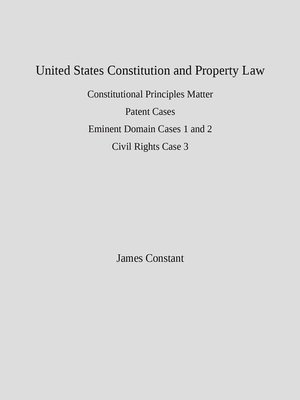
Sign up to save your library
With an OverDrive account, you can save your favorite libraries for at-a-glance information about availability. Find out more about OverDrive accounts.
Find this title in Libby, the library reading app by OverDrive.



Search for a digital library with this title
Title found at these libraries:
| Library Name | Distance |
|---|---|
| Loading... |
A patent claim filed in court is not decided under the "supreme law" of the land (Article I Section 8 of the Constitution) but under color of the huge and onerous Patent Law. Once an eminent domain case is filed in court it is not decided under the "supreme" law lof the land (5th Amendment) but under color of the huge and onerous Eminent Domain Law. Judges have been converted becoming the commissars and gauleiters of government and its agents, for taking property without compensation. Recently, in a 5 to 4 decision, the U. S. Supreme Court in Knick v. Township of Scott, Pennsylvania, No. 17-647, 588 U.S. ___, 139 S. Ct. 2162 (2019) held that a government violates the Takings Clause the moment it takes property without compensation, and a property owner may assert a Fifth Amendment claim under 42 U.S.C. § 1983 at that time, without pursuing a state-law remedy first. The intended, or unintended, effect of the Knick decision is to replace eminent domain law by the Takings Clause (Amendment V). Who knows, constitutional principles now matter.







